The First Deputy Speaker of the National Assembly speaks of a unilateral removal of his military guard. He sees behind this an ill intent by the ruling party.
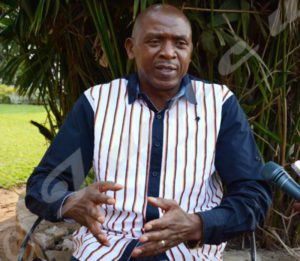
Agathon Rwasa: “They want to harm me.”
Agathon Rwasa deplores what he describes as the persecution by the ruling CNDD-FDD. The cause is the removal of the soldiers who guarded him without any explanation. Police officers came to replace them. The First Deputy Speaker of the National Assembly does not trust them.
This leader of the Burundian opposition sees in this unilateral decision a way to destabilize him. He speaks of a country where pluralism has no place or no dissonant voice is tolerated. He said his piece during the 4th round of inter-Burundian talks in Arusha, Tanzania. Since then, voices have been raised to challenge more and more this man who appears to the party in power as the real danger. “They try to force me into exile or harm me,” said Agathon Rwasa.
He says the military started guarding him in 2015. He had suffered very serious death threats. It was in a context of a bad precedent in 2010. He had escaped an attack at the last minute.
That leader’s concerns about the opposition are known to the government. Agathon Rwasa wrote a letter to the Army Chief of Staff. He noted that the change of his guard would not happen at this current moment of political turmoil. He subsequently sent a letter to the facilitator with a copy to the Heads of State of the EAC and various diplomats. He spoke of a demonization campaign, intimidation and threats by CNDD-FDD against him and any opposition from Bujumbura.
In any case, tensions are running higher on the side of the government and opposition on the eve of the referendum to amend the Constitution. Several arrests have been made against those who are campaigning for a no to its amendment.
Gaspard Baratuza: “A way of harmonizing…”
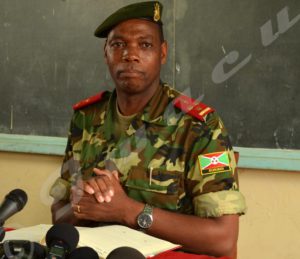
For the spokesman for the Ministry of Defense, Agathon Rwasa should not worry. “This is not to remove his security guard; the military guard will be replaced by police officers of equal strength.”
According to Gaspard Baratuza, it is a way of harmonizing the security for all the personalities of the parliament. He explains that all the other members of the parliament offices have the police as their guards. For him, the safety of the First Deputy-Speaker of the National Assembly must not be exceptional. Another reason put forward by this army spokesman is “securing national borders. “This is the primary mission of the army,” he justifies. He says the removal of the military aims at bringing them back to their main obligation.
What about the guards of the chairmen of the National Assembly and the Senate?
“The President of the National Assembly and the Senate have never had the military as a guard “
Asked about the recent measure of the Army chief of staff to replace the military guarding MP Agathon Rwasa by police officers, a source said that although this gives room for thinking about other hidden aims, Pascal Nyabenda and Révérien Ndikuriyo have always had the police as their guard since they came into office. This, he explains, is because the procedure is that political proxies are protected by the police and members of the executive by the military. He added: “If s/he considers that his/her security is threatened, a deputy or a minister can benefit from a high number of bodyguards. In long-term cases, the source asserts that a special derogation makes it possible for the concerned to be surrounded by “men of trust”. Otherwise, he insists, the procedure is meant to be as such.
Three questions to Gérard Birantamije
This political scientist, a specialist in security issues, returns to the conflict between Agathon Rwasa and the Ministry of Defense over the military guarding him.
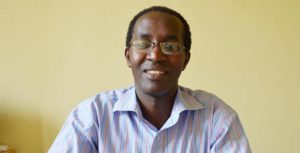 The safety of this First Deputy Speaker of the National Assembly is provided by police officers. Is he right to worry?
The safety of this First Deputy Speaker of the National Assembly is provided by police officers. Is he right to worry?
It must be admitted that the situation is complicated. In normal circumstances, there should be no relentlessness between the institutions of the Republic (National Assembly versus Ministry of Defense, National Assembly versus Police, etc.) on a personality with recognized responsibilities.
In terms of political analysis, this is the meaning that political actors give to their security and perceptions about the bodies in charge of security.
Of course, Agathon Rwasa is right to worry about what he sees as a threat to his security. This situation corroborates the perceptions that the Burundian populations have towards the army, the police and the intelligence services.
The fact that Rwasa sticks to the security ensured by the military, not the police, shows some confidence in the army. But even if there is the so-called Special Brigade for the Protection of Institutions (BSPI), the role of the army is not globally to ensure internal security.
How to understand this then?
Reading between the lines, such a reaction would reveal that the police are slightly politicized compared to the army. If BSPI were there to protect the institutions, Rwasa as the First Deputy-Speaker of the National Assembly has legally the legitimate right to claim them especially since the police do not inspire confidence for him and his family. As a remainder, his wife escaped an attack and little is known of the investigations conducted by the police.
Did this former rebel leader, today’s key political actor in the opposition, have the latitude to choose elements of his guard?
No. Rwasa cannot in any way have the right to choose his guard. He must abide by the decision taken by the organ in charge of such a mission, even if he is a former rebel leader! However, in a context of mutual suspicion and lack of dialogue between the institutions through the men and women who embody them, he can propose between the two units specialized in the protection of institutions, the one that inspires him confidence.
But it is up to the authorities in charge of the day-to-day management of the Army and / or the Police to provide men / women with the necessary elements for their protection. As the institutions must collaborate as a matter of principle, it is surprising that Rwasa can see his request rejected if the real mission of these specialized units is really to protect political and technical leaders within the institutions.
Any analyst would be tempted to say that these units embody more the latent missions than the manifest missions. All this gives credit to the concern raised by Mr. Rwasa on the removal of military elements from his guard in his recent correspondence addressed to the army chief of staff.
As Vice-President of the National Assembly, failing to honor his request undermines the sense of institutions and creates a bad antecedent. If the security of the institutions is managed according to political moods, there is a risk that the security forces are reduced to their mere expression.
Are the “harmonization” reasons for all members of the National Assembly Bureau “put forward by the Ministry of Defense, founded?
The spokesman for the Burundian army may be right to justify the impasse like that. But in fact the question lies elsewhere. Do the Police inspire confidence in the dignitaries of the Republic to allow the institutions to keep their quintessence?
At the death of Ndadaye, many actors raised the question of his guard. It is enough to read the writings around his assassination to realize that the “will of harmonization” raised by the spokesperson is only an escape.
Basically, Rwasa, in the light of press releases issued by his spokesman, seems to be “walking on the razor”. This adds to the fact that Rwasa is not the only one who does not trust the police, with regard to the arrests, the disappearances attributed to this body as it appears from the last report of the UN investigators, although challenged by the government in place. Finally, if one sticks to an aspect of political emotion, since he wants to continue to be in the same government with the party in power, the minimum would have been to listen to him and honor his wish, only for the symbolic dose of legitimacy of the CNDD-FDD government that he gave by entering the National Assembly and the Government.
But of course, politics is also a game of interest. Perhaps this legitimization of the regime is no longer a preoccupation of the current power, and that he is now a weak element that must be rid of at all costs. I do not know, but such reactions are generally bad news for the life of the institutions and the people who embody them.
Written by Abbas Mbazumutima, Agnès Ndirubusa, Edouard Nkurunziza, Hervé Mugisha and translated by Pierre Emmanuel Ngendakumana.

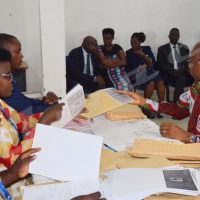
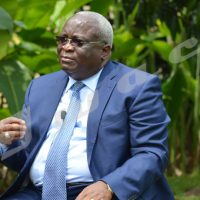
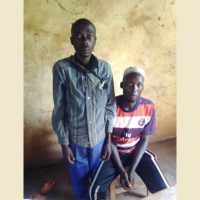

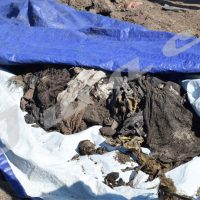













 IWACU Open Data
IWACU Open Data

